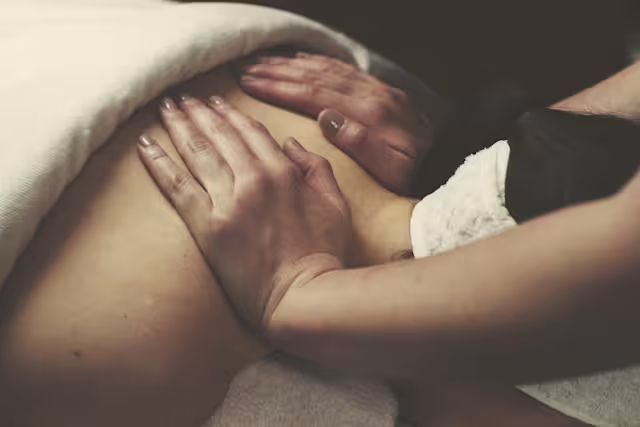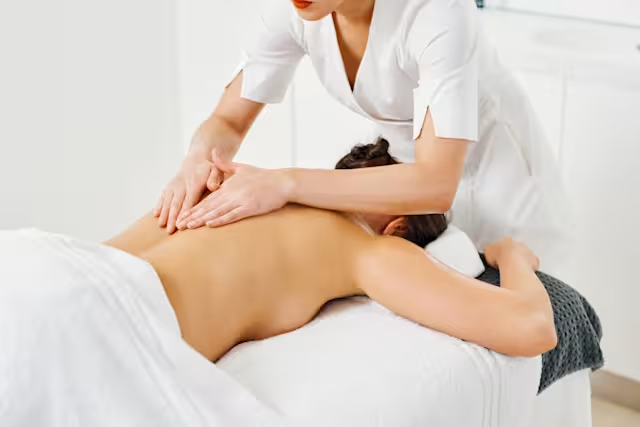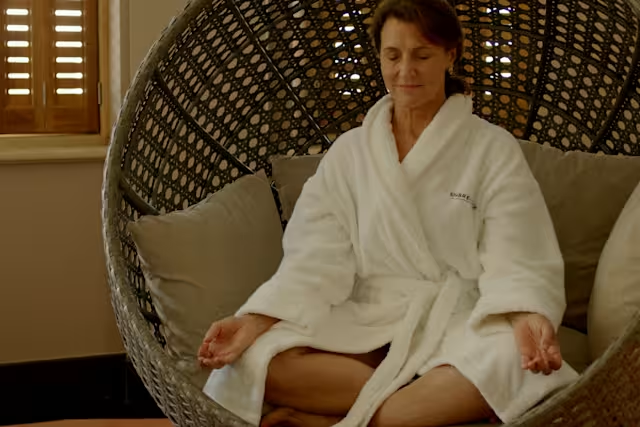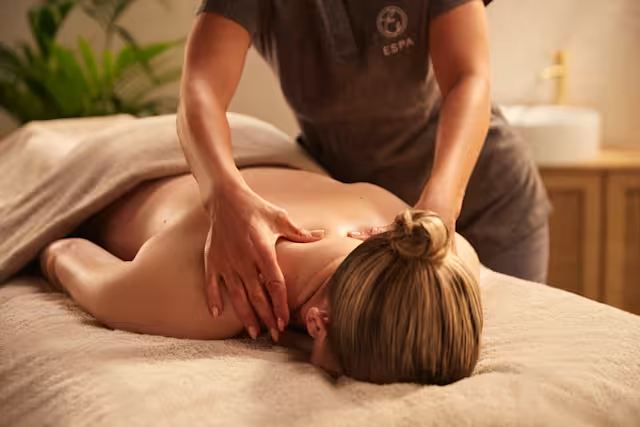Menopause and spa breaks or days
More and more of the 13 million women of menopausal or perimenopausal age in the UK are seeking holistic solutions to help manage menopause symptoms, and spas are here to help.
For far too long women have been experiencing menopause with minimal support, often feeling isolated and unsure about hormonal changes. We have spoken to women who are worried they are experiencing early onset dementia as a result of brain fog, who enter medical menopause suddenly as a result of cancer treatment, who struggle to adjust to the changing needs of their skin, or who haven't had a good night's sleep in months.
While medical solutions like HRT (Hormone Replacement Therapy) are helpful, the wellbeing sector has been working hard to meet the holistic needs of women as they approach and experience this period of change in their lives. Seeking to not only ease the unwanted side effects of hormonal change, but to help women feel their best during and beyond menopause, leading spas, therapist trainers and skincare brands have been working together to offer spa experiences that proactively support menopausal women.
Using elements ranging from acupressure to phytohormones (naturally occurring plant hormones), aromatherapy, massage and other holistic therapies, here you will find more information about how spas are supporting women. You can also discover some of the best spa experiences, proactively tailored to women experiencing menopausal symptoms.
Can spa treatments really help with menopause symptoms?
Yes, they can. While there's no magic bullet for treating menopause symptoms, there is a lot of research to show that a range of holistic therapies and practices (from aromatherapy to yoga) can help soothe and manage the unwanted menopause symptoms, especially in the short-term.
For long-term benefits, practitioners generally agree that a multifaceted approach, combining holistic therapies with lifestyle choices, including diet and exercise, and sometimes medical interventions, offers the best outcomes.
Individual therapies are showing positive results in randomised trials, for helping to manage specific menopause symptoms. For example, acupuncture for hot flushes. Anecdotally, there is lots of evidence that women find spa treatments helpful for navigating menopause, from helping to reduce stress, to feeling more comfortable in their own skin.
What are the best spa treatments for menopause?
Different spa treatments suit different people, and offer support for a variety of menopause symptoms. In general, the relaxation benefits of any spa treatment are helpful during menopause. However, research shows that the following therapies are especially beneficial.
Spa therapies that were found to be helpful included:
- Reflexology
- Homoeopathy
- Hypnosis
- Mindfulness
- Exercise
- Yoga
- Aromatherapy
- Acupressure/acupuncture
Alongside therapies, phytoestrogens (plant oestrogens, which can be found in some natural skincare products and certain foods) can be used at home and in spa treatments to optimise skincare during menopause. In addition, lifestyle factors that can be addressed in specialist spa environments to support wellbeing during menopause include:
- Nutrition
- Movement
- Sleep
- Stress reduction
What are the best spa treatments for hot flashes and night sweats?
Most women find that it’s not one thing but a combination of factors rather than helps to address specific menopause symptoms. However, some studies have shown that certain spa treatments have specific benefits. For example:
Can massage help with menopause-related joint pain?
Yes. Massage is generally soothing when it comes to joint pain, no matter the cause, typically helping to reduce pain and stiffness. Massage is also shown to be beneficial for joint pain attributed to menopause, helping to improve mobility, function, and reduce pain.
What skincare ingredients should I look for during menopause?
There's no 'should' when it comes to the products you use in your skincare routine during menopause. It's about what you feel works best for you. Some women like to explore dedicated anti-ageing products, while others prefer a more natural approach.
That said, women often find that their skin changes during menopause, with symptoms ranging from increased sensitivity to dryness, itchiness and irritation, as well as enhanced lines and wrinkles. It's therefore recommended that you use products that are gentle on your skin, avoiding any highly astringent cleansers, for example.
Lots of skincare brands, including spa skincare brands, have dedicated product lines for use during and beyond menopause. Some feature phytoestrogens, which are plant-derived compounds that 'mimick' oestrogen are also popular as a natural approach to anti-ageing skincare.
How often should I get spa treatments during menopause?
There’s no specific recommendation for how often you should have spa treatments during menopause. You may prefer to have them once in a while as part of your general wellbeing, or as part of an ongoing holistic approach to managing menopause symptoms. Whether it’s acupuncture, aromatherapy massage, reflexology, another holistic treatment or something else, it’s about finding what works best for you.
Are there any spa treatments I should avoid?
Different people have different experiences of menopause and that can be for lots of reasons. However, some lifestyle factors are thought to contribute to the severity of symptoms.
For example, the Mayo Clinic identifies smoking and obesity as potential risk factors, while the NHS suggests that possible triggers for common symptoms like hot flashes include spicy food, caffeine, hot drinks, smoking and alcohol.
The advice is to pursue a healthy lifestyle, with general recommendations from Cambridge University Hospitals including:
- Regular exercise to improve bone density, cardiovascular health and lower cortisol levels.
- A healthy diet with a focus on calcium and vitamin D, plenty of fruit and vegetables, limited processed food, plenty of phytoestrogens and reduced caffeine and alcohol.
- Focus on mental wellbeing for reduced stress levels and managing anxiety, as well as helping to manage sleep quality.
Finding the right menopause spa experience
To find the right menopause spa experience for you, the most important thing is that you choose something you think you will enjoy. If you fancy having a massage, book one. If you feel like having a facial, do it. There’s no right or wrong when it comes to spa treatments during menopause. If you would like to find a spa experience that’s dedicated to addressing menopause symptoms or optimising wellbeing during menopause, some spa destinations have dedicated spa packages available. Speak to the team at Spabreaks.com to find out more.
What is menopause?
Menopause is typically defined as when women's periods stop and her childbearing years come to an end as hormone levels decrease. This is generally a natural part of the ageing process, although it can be brought on early by other things like certain cancer treatments. That said, the association of periods with menopause oversimplifies what happens and why during this life stage. In reality, menopause happens over many years, and the cessation of menstrual cycles is just one factor.
What are the stages of menopause?
There are, in fact, three stages of menopause (perimenopause, menopause and post-menopause), and many symptoms that can occur with varying degrees of intensity over a 20 year period. Some women experience almost all of those symptoms, others very few.
Broadly speaking, the three stages are defined as follows:
Perimenopause
Perimenopause is considered the transitional time around menopause, in which you may start to have some symptoms that show your body is changing, but you still have your periods.
- It can last for up to 10 years and is a slowing down of the reproductive cycle,
- Women produce less oestrogen, fertility slows down and some women experience more irregular menstrual cycles.
- Some women begin to see signs of perimenopause in their thirties, but it’s more typically associated with your early forties.
Menopause
Menopause is considered to be the point at which a woman's periods have stopped as a result of lower hormone levels.
- It usually occurs around the ages of 45 to 55
- Doctors usually confirm menopause when it's been 12 months since a woman's last period.
Post-menopause
Post-menopause is the time after that 12-month mark since a woman had her last period. At that time women no longer menstruate, and often women find that the menopause symptoms subside.
Common menopause symptoms
There is some debate around the number of menopause symptoms that there are, and that's largely because science is still learning. Head to Google and you will find articles that say there's anything from 34 to 100. No doubt the more research that's done, the more those figures will change.
Jennifer Young, one of the spa industry leaders, who has developed spa therapies and therapist training designed to help women have a better experience with menopause, has done her own research and identified 76 menopause symptoms to date.
Some of the most common menopause symptoms include:
- Mood changes
- Changes in sexual desire
- Trouble concentrating
- Headaches
- Night sweats
- Hot flashes
- Vaginal dryness
- Trouble with sleep
- Joint and muscle aches
- Heavy sweating
- Having to pee often
- PMS-like symptoms
- Anger
- Irritability
- Anxiety
- Sadness
- Low mood and feelings of depression
- Heart disease
- Osteopenia (loss of bone mass)
- Osteoporosis (fragile bones)
- Skin changes
You might also like: menopause-focused spa resources

Menopause spa treatments from VOYA
VOYA is the skincare brand known for using the natural healing powers of organic seaweed, sustainably harvested in County Sligo, Ireland. They've turned their expertise and their natural products to creating three separate “tides” or treatments to address the different symptoms of menopause.
Read more
TEMPLESPA skincare for menopause
TEMPLESPA is known for its Mediterranean-inspired products and spa treatments, which they have combined with CBD, green mandarin and Himalayan salt rich in magnesium, potassium and calcium in their menopause spa treatments.
Read more
[ COMFORT ZONE ] skincare for hormonal change
[ COMFORT ZONE ] is one of the spa world’s leading brands, recognised for their regenerative, effective, made-in-Italy products, treatments, and rituals. Their menopause treatments were created with their Scientific Committee nutri-dermatologist Dr Maria Bucci and British holistic hormone expert Dr Alyssa Burns Hill, to help address all stages of the menopause (including post and perimenopause).
Read more
The Menopause Million
Read about The Menopause Million - the largest global research project into menopause, to understand how it's seeking to turn big data into meaningful results for women's health.
Read more
You’ve heard of GenZ but what about GenM?
The GenM Collective is the menopause partner for brands helping businesses to support women in menopause meaningfully. Discover one of the spas working in collaboration with them and why.
Read more
How The Lowry Hotel is tailoring support for women in menopause
The Lowry Hotel is well known for being a beautiful, contemporary hotel on the edge of Manchester city centre, and their Press Pause on Menopause spa experiences highlight their unique focus on personalised wellbeing.
Read more
Struggling with anxiety during menopause? Here's what you need to know
Discover how menopause can impact anxiety and explore practical tips for managing symptoms. Learn about the connection and find strategies for relief during this challenging time.
Read more
How ESPA is helping women navigate menopause
ESPA talks about their dedicated menopause skincare and treatment collection in partnership with GenM.
Read more